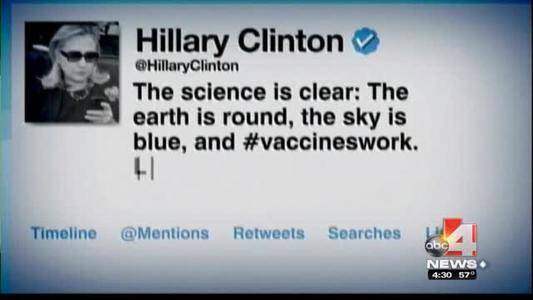There is nothing more American than the anti-vaccination movement. This is a country that finds Hannibal Lecter endearing because he ate a census taker with some fava beans. Refusing the slightest demands from society is our birthright.
As for the idea that other parents should vaccinate their children while you keep yours “pure,” I’m reminded of a classic Onion story on American attitudes toward reducing auto traffic: “Report: 98 Percent Of U.S. Commuters Favor Public Transportation For Others.”
Julia Azari, in a perceptive post at Mischiefs of Faction, says we shouldn’t be surprised that Chris Christie and Rand Paul were loath to criticize parents who refuse to vaccinate kids against the measles and other infectious diseases. They reflexively urged “choice” and “voluntary” behavior because these buzzwords are part of the Republican Party’s DNA, especially since Ronald Reagan mainstreamed the concept of assuming that anything the government promotes must be a trap. Azari argues that the Republicans are in the grip of “late regime politics,” in which founding principles are applied without regard to changed circumstances.
“Just as Jimmy Carter had trouble adapting New Deal ideas to address issues like energy and inflation,” Azari writes, “Reagan-era individualism may not be suited to address public health crises and economic inequality. But it remains a seemingly unshakeable paradigm for political leaders whose careers were built on these premises.”
Not that Azari lets Democrats off the hook. As she notes, there are only “modest” differences between Democratic and Republican voters on the issue, with one-fifth to one-third saying parental choice should trump vaccination requirements—though the New York Times’ Brendan Nyhan worries that the counterarguments from Barack Obama and Hillary Clinton will have the “perverse effect” of turning vaccination into a partisan issue.
As Azari’s post suggests, it’s an oversimplification to dismiss Republicans as stupid or anti-science, since both parties sanctify individual choice in different ways. (But blaming measles on “illegal aliens,” as Alabama Rep. Mo Brooks has done, really is just stupid.) Just as Democrats are instinctively suspicious whenever banks or other corporations seem to limit consumer choice, Republicans pause whenever they’re asked to trust the authorities on the subject of raising children.
Still, the anti-vaxxers fit into the don’t-tread-on-me worldview now associated with opposition to Barack Obama—though this could change significantly with a Republican president, or if the protests against militarized police tactics grow to include other civil authorities. One poll finds that support for mandatory vaccination is also much lower among younger Americans (42 percent), and Josh Marshall writes, “I think the reality is that society seems to have lost the historical memory of various horrific endemic childhood diseases.” This explains why Paul, the Republican presidential candidate who is counting the most on younger voters, can’t resist the language of rebellion here.
The fear that vaccinations could have unintended consequences (“profound mental disorders,” as ophthalmologist Paul put it, without regard to accepted science) is similar to some people’s alarm over genetically modified (GMO) foods. There’s an age gap on that issue as well: Last fall an Oregon poll found that voters under 36 favored a law requiring the labeling of GMO foods by 61-31, while voters over 65 opposed it by 33-57. (The measure narrowly lost, with a similar proposal going down in Colorado by a bigger margin.) In that case, younger voters were suspicious of corporate America and older voters resisted government regulations. The vaccination issue suggests that when pharmaceutical companies and public health authorities are on the same side, younger voters are not necessarily reassured.
I have not yet seen polling data on whether young people share Pat Robertson’s suspicion of fluoridated water (“What does fluoride do to people? We don’t know some of the consequences, that's all I’m saying.”), but I would not be surprised to see the “purity” of drinking water become a cause célèbre on campus.
The Washington Monthly’s Harold Pollack sees the anti-vaccination movement as part of “globalized mistrust,” which can lead skeptical people to make stupid decisions: “If you distrust everyone and everything in the financial world, you may hide your cash in a mattress. You may also end up investing with some persuasive charlatan rather than with some reasonable mutual fund. Every day, people trust the wrong advice. Blind trust or distrust—and sometimes a combination of both– isolates people from readily-available critical information, making them easy prey for fraud.”
This is the same kind of reasoning that keeps many Americans from voting: They distrust everyone and everything in the political world, and this view absolves them from making any distinction between well-meaning but imperfect public officials and those who are unapologetically corrupt or demagogic. This is not a healthy attitude for the body politic.








